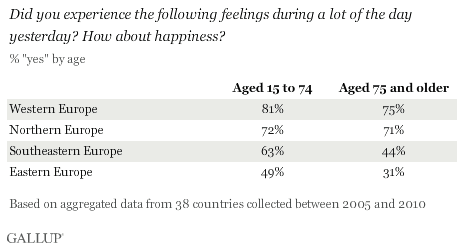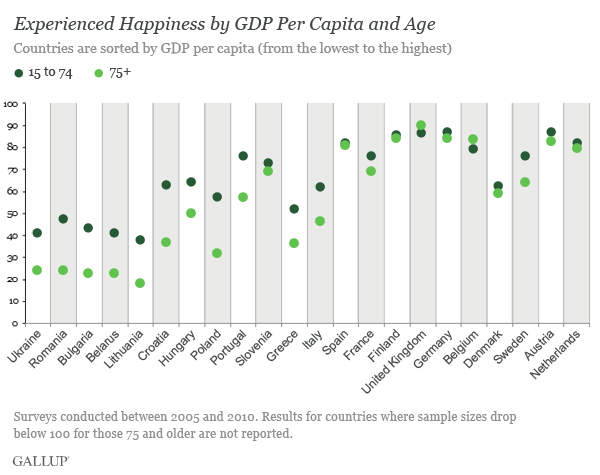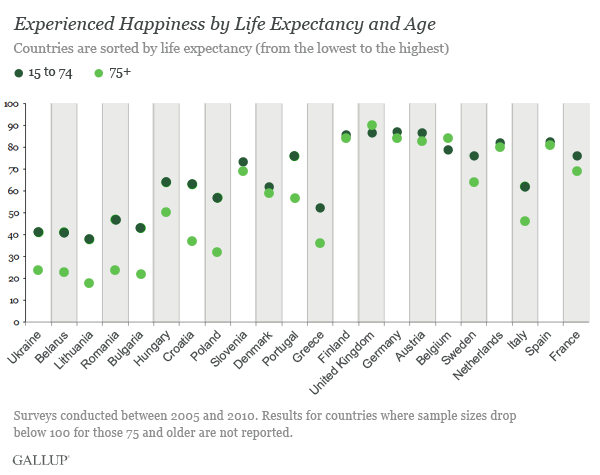BRUSSELS -- For Europeans as a whole, growing older generally means growing less happy. Fifty-seven percent of Europeans aged 75 and older said they experienced happiness "yesterday" versus 66% of younger residents who said the same. However, older Europeans fare better in certain regions, with happiness declining little in northern Europe.

These data, aggregated from Gallup surveys conducted in 38 European countries between 2005 and 2010, reveal that people tend to be happier into old age in some countries and not others. In a number of countries -- mostly in northern and western Europe -- there is a slight decline or no decline at all in how likely people are to report happiness after age 75.
Wealth and longevity may have a lot to do with happiness. Older people tend to be more likely to remain as happy as the rest of the population in countries with higher GDPs (about $30,000 per capita or higher) -- such as the United Kingdom and Belgium -- and in countries with higher life expectancies (78 years or more) -- such as Germany and Austria. Younger people's reported happiness, on the other hand, varies less by GDP and life expectancy.
Lower GDP, Lower Happiness
Happiness among the young and old is much lower in poorer European countries than in wealthier ones. In countries with lower GDPs (lower than $20,000 per capita PPP), a smaller percentage of the general population experienced happiness the day prior to the survey (less than 65%). The worst off are the former Eastern bloc countries, particularly Romania and Bulgaria, which have GDPs of about $12,000 to $13,000. Less than 50% of the population in these countries report experiencing happiness the day before the survey.
This effect is even more marked in the oldest age group. In lower GDP countries, less than 40% of older people, on average, report experiencing happiness. In the poorest of these countries, happiness in the oldest age group is about half what it is in the general population, dropping lower than 30%.

In many countries with higher GDP, the gap between the happiness of older and younger people is small, generally less than 10 percentage points. In western Europe, 81% of the general population and 75% of the oldest age group report having experienced happiness the previous day.
In fact, adults aged 75 and older in the wealthiest countries are more likely to experience happiness daily than the general population in poorer countries. People aged 75 and older in the richest countries -- such as the United Kingdom and Germany -- are up to three times more likely to experience happiness in their everyday lives than older people in the poorest countries.
Life Expectancy Is Also an Important Factor
As life expectancy increases, people in the 15 to 74 and the 75 and older age group are more likely to experience happiness. Older people in countries with life expectancies of 78 years or higher are more than twice as likely to experience happiness than older people in countries where life expectancies are lower than 73 years.
In countries where life expectancy is higher, older and younger people generally report similar levels of happiness. In countries with lower life expectancies, however, older people are much less likely than those aged 15 to 74 to report happiness. Life expectancy is related to GDP; most countries with higher GDPs also have higher life expectancies.

Implications
Health is an important aspect of overall well-being, and may be more important for the elderly as health declines in old age. Many of the countries in the lower GDP group also have lower satisfaction with personal health and lower satisfaction with the availability of quality healthcare, ranging from 35% of the general population in Bulgaria to 92% in Austria.
The link between higher GDP and higher likelihood of happiness -- particularly for older people -- is in line with a prior analysis of Gallup data that found GDP relates to life satisfaction as well as to health satisfaction in old age. In wealthier nations, life satisfaction is higher and people are more satisfied with their health in old age.
For complete data sets or custom research from the more than 150 countries Gallup continually surveys, please contact SocialandEconomicAnalysis@gallup.com or call 202.715.3030.
Survey Methods
Results are based on 83,747 face-to-face and telephone interviews with approximately 1,000 adults in each country, aged 15 and older, conducted between 2005 and 2010 in 38 countries. For results based on the total samples, one can say with 95% confidence that the maximum margin of sampling error ranges from ±3.1 percentage points to ±5.7 percentage points. The margin of error reflects the influence of data weighting. In addition to sampling error, question wording and practical difficulties in conducting surveys can introduce error or bias into the findings of public opinion polls.
For more complete methodology and specific survey dates, please review Gallup's Country Data Set details.
